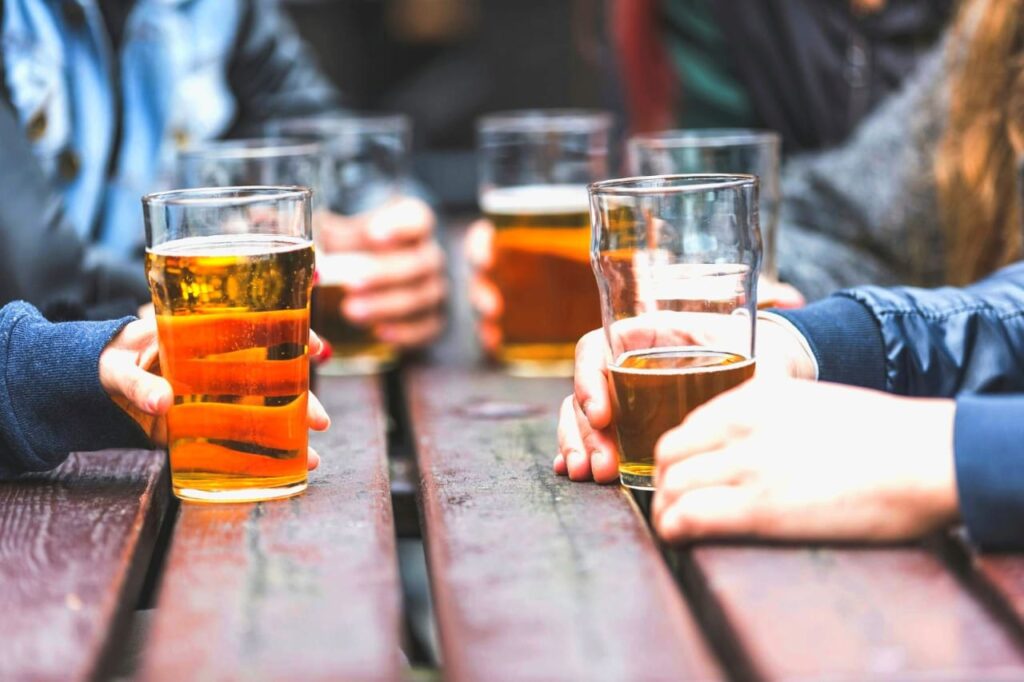When it comes to alcohol, your drink of choice might reveal more about your diet and lifestyle than you think. Recent research has uncovered striking differences in the dietary habits, physical activity levels, and overall lifestyle choices of people who prefer beer, wine, or liquor. Let’s dive into the findings and see who’s making the healthiest choices.
Beer Drinkers: A Lifestyle Under the Microscope

According to the study, beer drinkers scored the lowest on the Healthy Eating Index, which measures diet quality on a 100-point scale. With an average score of 49, beer enthusiasts fell short compared to wine drinkers (55 points) and those who preferred liquor or a combination of alcohol types (53 points).
Beer-only drinkers were more likely to be male, younger, and from low-income groups. They also reported:
- Higher daily caloric intake: Beer drinkers consumed significantly more calories per day than other groups.
- Lower physical activity levels: This group was the least active compared to wine or liquor drinkers.
- Higher smoking rates: Smoking was more prevalent among beer enthusiasts, further impacting their overall health.
Dr. Madeline Novack, the lead author of the study, highlighted that beer is often consumed in environments where food options are low in fiber and high in carbohydrates and processed meats.
“Beer’s popularity in these settings might explain the correlation between beer consumption and poorer diet quality,” Novack explained.
Wine Drinkers: The Balanced Choice?

Wine drinkers, particularly those who prefer red wine, appeared to make more balanced dietary choices. Their higher Healthy Eating Index score reflected better overall eating habits, which often included:
- Vegetables and fruits: A staple in meals often paired with wine.
- Dairy and lean meats: Common accompaniments to wine.
Dr. Novack also pointed out that dietary habits might influence alcohol preferences. For instance, wine is typically consumed with more nutrient-rich meals, which contrasts with beer’s pairing with salty, fried, or processed foods.
However, the study’s results indicate that even wine drinkers fell short of the 80-point benchmark for an adequate diet, suggesting that there is still room for improvement.
Liquor Drinkers: In the Middle Ground

Liquor drinkers and those who consumed a mix of alcohol types scored just below wine drinkers on the Healthy Eating Index, averaging around 53 points. Their dietary habits and lifestyle choices appeared to be somewhat healthier than beer drinkers but not as balanced as wine enthusiasts.
Alcohol and Liver Health: A Critical Link
Dr. Novack emphasized that regardless of alcohol type, excessive consumption can lead to serious health issues, particularly liver disease. Alcohol abuse remains the leading cause of cirrhosis in the United States. Additionally, metabolic dysfunction-associated steatotic liver disease is becoming increasingly common, often coexisting with alcohol-related liver damage.
“Lifestyle changes, including understanding the connection between alcohol use and poor nutrition, are essential for managing and preventing liver disease,” Novack noted.
The Role of Healthcare Providers
Both Dr. Novack and registered dietitian Stephanie Schiff urge individuals to discuss their alcohol consumption with healthcare professionals.
“While alcohol was once thought to have health benefits, even red wine’s ‘health halo’ is fading,” Schiff explained. “Reducing alcohol intake and focusing on a whole-food, plant-heavy diet is a step in the right direction for most people.”
Healthcare providers can use this information to guide patients toward healthier lifestyle choices. Open conversations about drinking habits, combined with personalized nutrition advice, can make a significant difference.
Limitations of the Study
It’s worth noting that the study relied on self-reported data, which may not always be accurate. Participants might have underestimated or overestimated their eating and drinking habits. Nonetheless, the findings align with earlier research, including a 2006 Danish study that also linked wine consumption with healthier dietary patterns.
A Snapshot of Earlier Research
The Danish study found that wine drinkers were more likely to purchase:
- Healthy staples: Olives, fruits, vegetables, poultry, cooking oil, low-fat cheese, and lean meats.
- Less processed options: Wine drinkers avoided ready-cooked dishes, sugary foods, and soft drinks.
In contrast, beer drinkers gravitated toward items like chips, cold cuts, sausages, butter, and sugary beverages.
